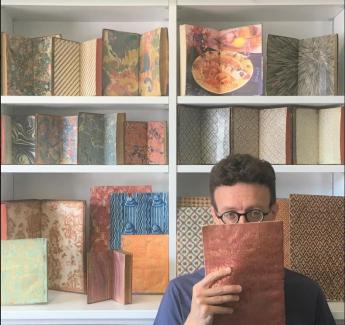News & Updates Simon Beattie Ltd
Do You Love Endpapers? An Interview with UK bookseller Simon Beattie

Quoting from the article:
"God forgive, I recently broke my own first commandment of book collecting: Thou shalt not buy a book but for its contents! Well, I did—worse, I bought a book for... its endpapers! It is not my entire fault, though. For the past few months, I have joined an apparently misleading group of weird worshippers. Their den? A Facebook group. They war cry? We Love Endpapers!...
...
- What is the most accurate definition of "endpapers"?
Endpapers are the double leaves added at the front and back of a book by the binder; the outer leaf of each is pasted to the inner surface of the cover (hence 'pastedown'), the inner leaves (or 'free endpapers') form the first and last leaf of the volume when bound.
- When did the first endpapers appear in bookbinding?
Books from the Middle Ages to the Renaissance sometimes had only a pastedown, a narrow strip (or guard) covering the bands on the spine, and sometimes no endpapers at all.
- Was there a specific period of time when they developed?
Endpapers had become pretty much standard practice by the 17th century, and this is also when decorative papers (e.g. marbled) first appear. Brocade papers, and block-printed papers, develop during the 18th century, although I think of them as Continental taste as far as endpapers are concerned.
- Do you know if some printers or binders printed their own endpapers? There were a lot of regulations regarding printing, binding, etc. Was it the case with endpapers?
- Binders would have made their own paste papers, using up paste left over from binding. Brocade and block-printed papers were made by specific manufacturers, such as those in Augsburg, or Orléans, and can be identified. I'm not sure of regulations regarding printed papers. I expect the French dominotiers had regulations, but probably completely different rules from printers of books. ..."
Read the full article on the Rare Book Hub website here
Or simply sign up for the Facebook Group "We Love Endpapers" - a wonderful way to pass time on the Internet and to connect with likeminded bibliophiles.
The Antiquarian Booksellers Association of America (ABAA) asked Mr Beattie to put together a "Beginner's Guide for Decorated Papers". The article can be found here.
Simon Beattie is a member of The Antiquarian Booksellers Association (ABA) and an affiliate of the International League of Antiquarian Booksellers (ILAB).
